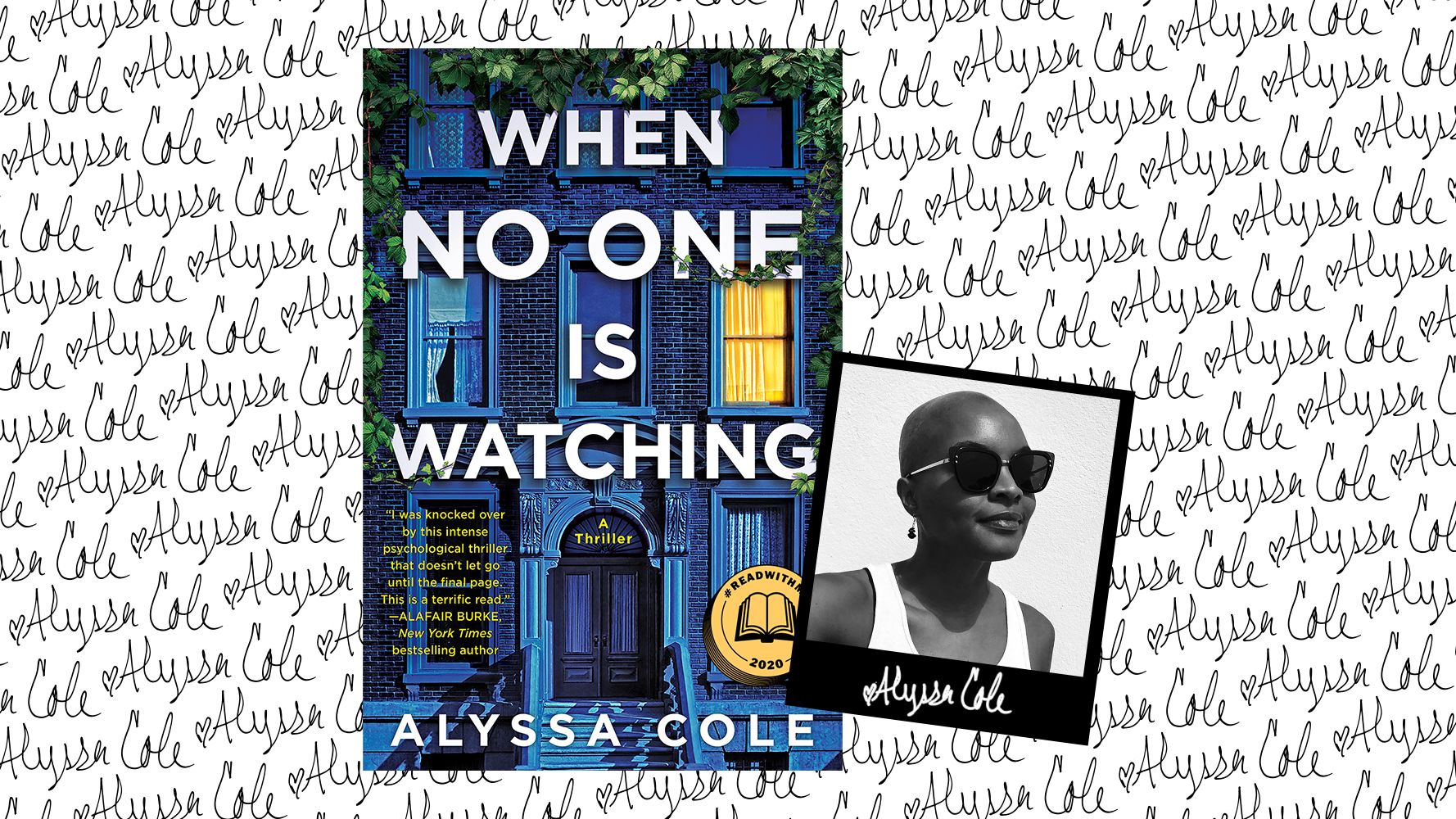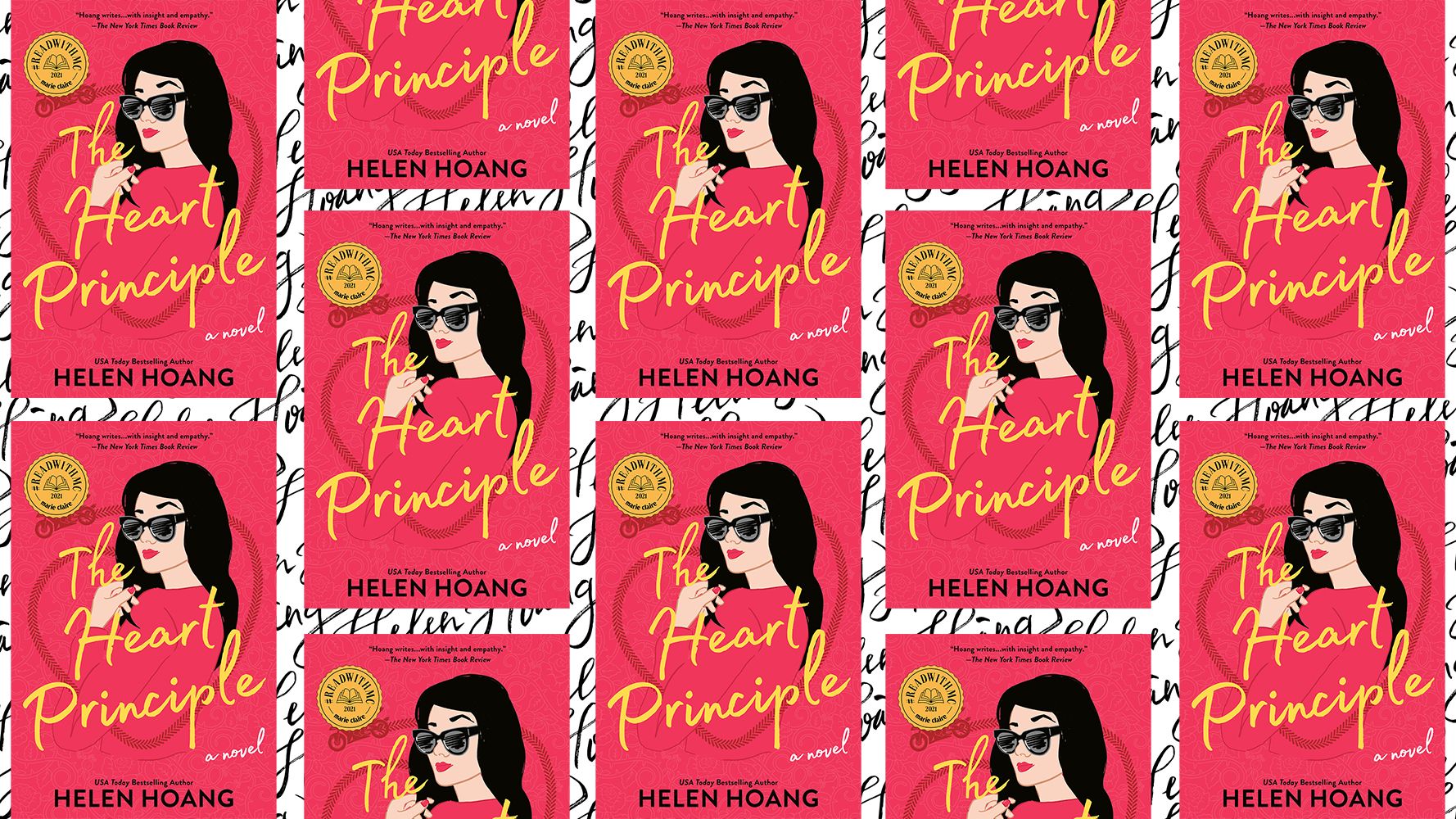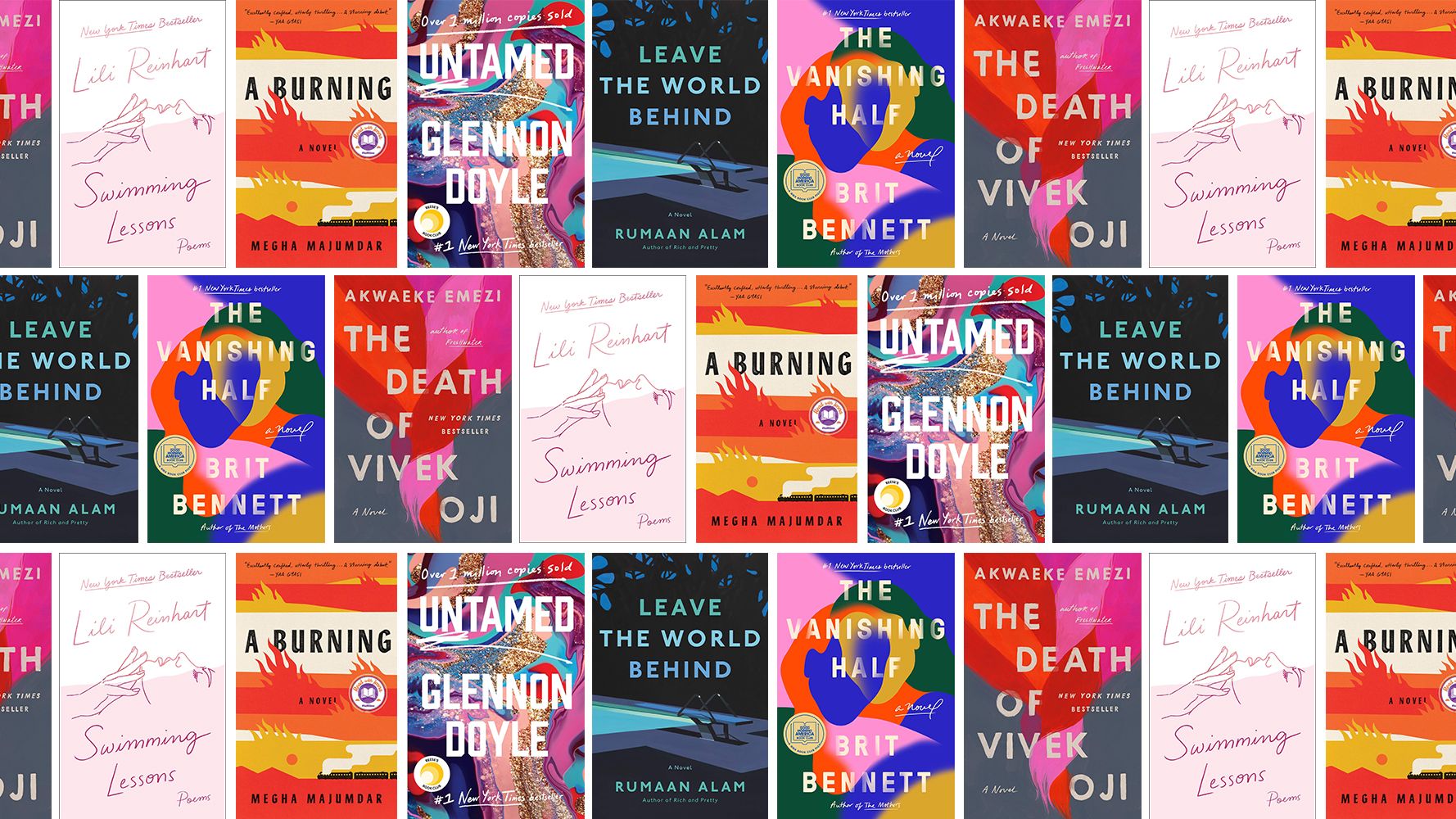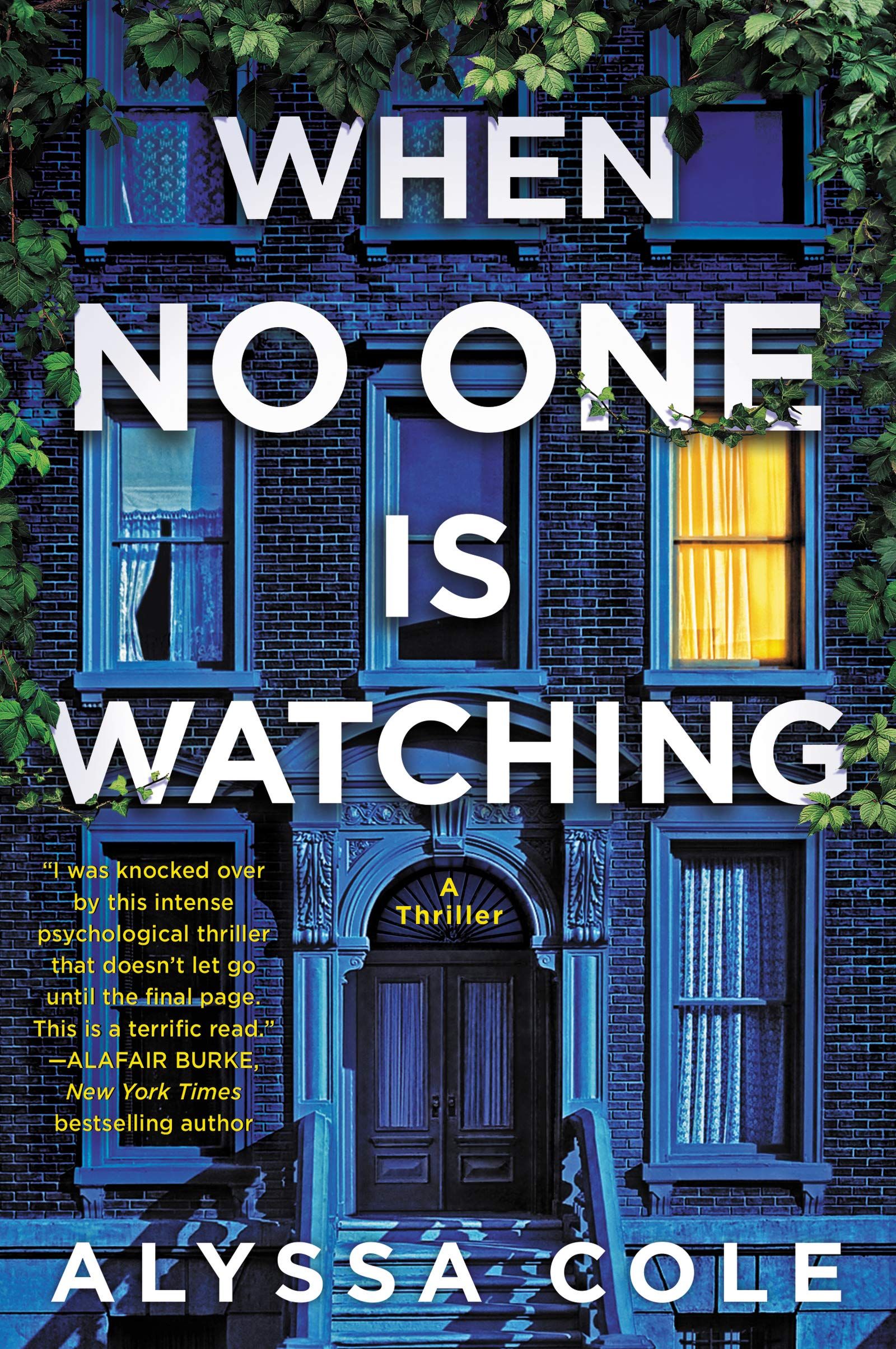'When No One Is Watching' Is Marie Claire's September Book Club Pick
Read an excerpt from Alyssa Cole's novel, here, then dive in with us throughout the month.


Welcome to #ReadWithMC—Marie Claire's virtual book club. It's nice to have you! In September, we're reading award-winning author Alyssa Cole's When No One Is Watching (September 1)—a novel about gentrification that turns sinister when main character Sydney and her neighbor Theo realize that their neighbors may not have actually moved out after all. Read an excerpt from the book, below, then find out how to participate in our virtual book club here. (You really don't have to leave your couch!)
I spent deepest winter shuffling back and forth between work and hospital visits and doctor’s appointments. I spent spring hermiting away, managing my depression with the help of a CBD pen and generous pours of the Henny I’d found in Mommy’s liquor cabinet.
Now I’m sitting on the stoop like I’ve done every morning since summer break started, watching my neighbors come and go as I sip coffee, black, no sugar, gone lukewarm.
When I moved back a year and a half ago, carrying the ashes of my marriage and my pride in an urn I couldn’t stop sifting through, I thought I’d be sitting out here with Mommy and Drea, the holy trinity of familiarity restored—mother, play sister, prodigal child. Mommy would tend to her mini-jungle of potted plants lining the steps, and to me, helping me sprout new metaphorical leaves—tougher ones, more resilient. Drea would sit between us, like she had since she was eleven and basically moved in with us, since her parents sucked, cracking jokes or talking about her latest side hustle. I’d draw strength from them and the neighborhood that’d always had my back. But it hadn’t worked out that way; instead of planting my feet onto solid Brooklyn concrete, I’d found myself neck-deep in wet cement.
Last month, on the Fourth of July, I pried open the old skylight on the top floor of the brownstone and sat up there alone. When I was a teenager, Mommy and Drea and I would picnic on the roof every Fourth of July, Brooklyn sprawling around us as fireworks burst in the distance. When I’d clambered up there as an adult, alone, I’d been struck by how claustrophobic the view looked, with new buildings filling the neighborhoods around us, where there had once been open air. Cranes loomed ominously over the surrounding blocks like invaders from an alien movie, mantis-like shadows with red eyes blinking against the night, the American flags attached to them flapping darkly in the wind, signaling that they came in peace when really they were here to destroy.
To remake.
Maybe my imagination was running away with me, but even at ground level the difference is overwhelming. Scaffolds cling to buildings all over the neighborhood, barnacles of change, and construction workers gut the innards of houses where I played with friends as a kid. New condos that look like stacks of ugly shoeboxes pop up in empty lots.
Get exclusive access to fashion and beauty trends, hot-off-the-press celebrity news, and more.
The landscape of my life is unrecognizable; Gifford Place doesn’t feel like home.
I sigh, close my eyes, and try to remember the freedom I used to feel, first as a carefree child, then as a know-it-all teenager, as I held court from this top step, with the world rolling out before me. Three stories of century-old brick stood behind me like a solid wall of protection, imbued with the love of my mother and my neighbors and the tenacity of my block.
Back then, I used to go barefoot, even though Miss Wanda, who’d wrench open the fire hydrant for kids on sweltering days like the ones we’ve had this summer, used to tell me I was gonna get ringworm. The feel of the stoop’s cool brown concrete beneath my feet had been calming.
Now someone calls the fire department every time the hydrant is opened, even when we use the sprinkler cap that reduces water waste. I wear flip-flops on my own stoop, not worried about the infamous ringworm but suddenly self-conscious where I should be comfortable.
Miss Wanda is gone; she sold her place while I was cocooned in depression at some point this spring. The woman who’d been my neighbor almost all my life is gone, and I didn’t even get to say goodbye.
And Miss Wanda isn’t the only one.
Five families have moved from Gifford Place in less than a year. Five doesn’t seem like much, but each of their buildings had three to four apartments, and the change has been noticeable, to say the least. And that doesn’t even count the renters. It’s gotten to the point where I feel a little twinge of dread every time I see a new white person on the block. Who did they replace? There have, of course, always been a few of them, renters who mostly couldn’t afford to live anywhere else but were also cool and didn’t fuck with anybody. These new homeowners move different.
There’s an older, retired couple who mostly have dinner parties and mind their business, but call 311 to make noise complaints. Jenn and Jen, the nicest of the newcomers, whose main issue is they seem to have been told all Black people are homophobic, so they go out of their way to normalize their own presence, while never stopping to wonder about the two old Black women who live next door to them and are definitely not sisters or just friends.
Then there’re the young families like the people who moved into Miss Wanda’s house, or those ready to start a family, like Ponytail Lululemon and her Wandering Eye husband, who I first encountered on the historical tour. They bought the Payne house across the street—guess they had been casing the neighborhood.
They don’t have blinds, so I see what they do when they’re home. She’s usually tearing shit apart when she’s there, renovating, which I guess is some kind of genetic inheritance thing. He seems to work from home and likes walking around shirtless on the top floor. I’ve never seen them actually interact; if I had a man walking around half-naked in my house, we’d be more than interacting, but that’s none of my business.
The shrill, rapid-fire bark of a dog losing its shit pulls me from my thoughts.
“Goddammit, somebody put him in his cage before the guests arrive! Terry!” a woman yells, followed by a man shouting, “Christ, calm down, Josie! Arwin! Did you let Toby out of his cage?”
Terry and Josie and Arwin and Toby are Miss Wanda’s replacements. They’ve never properly introduced themselves, but with all the yelling they do, I figured out their names quickly.
Toby barks incessantly while they’re at work and school and whenever he damn well pleases because he needs more exercise and better training. Terry wears ill-fitting suits to work, leers at the teenage girls in the neighborhood, and doesn’t pick up Toby’s shit when he thinks no one is watching. Josie wears tailored suits to work, spends her weekends dividing her backyard garden into exactly sized plots, and obsessively posts in the Columbus-ly titled OurHood app about people who don’t pick up dog waste.
Claude, my first post-divorce friend with benefits, used to call my new neighbors “Becky and Becky’s Husband.” We laughed at how they’d peek suspiciously at him through the curtains when he waited for me in his car out front, or how they’d hurry past when he stood at my front door in sagged jeans and Timbs instead of his tailored work suits and loafers.
Claude is gone now, too. He texted right before Valentine’s Day:
Not feelin’ this anymore.
Maybe there’d been another woman. Maybe I’d spent too much time stressing over my mother. Maybe he’d just sensed what I’d tried to hide: that my life was a spinout on a slick road and the smart thing to do was pump the brakes while he could.
When Drea had opened her apartment door and found me sniffling as I clutched a pint of Talenti, she’d hugged me, then given my shoulder a little shake. “Girl. Sydney. I’m sorry you’re sad, but how many times do I have to tell you? You won’t find gold panning in Fuckboy Creek.”
She was right.
It’s better this way; a warm body in bed is nice in the winter but it’s too damn hot for cuddling in the summer unless you want to run the AC nonstop, and I don’t have AC-nonstop money at the moment.
I notice a group of people approaching from the far end of the block, down by the garden, and scratch at my neck, at the patch of skin where a few months ago three itchy bites had arisen all in a row. BEDBUGS had been the first result of a frantic “what the fuck are these bites” internet search. Plastic-wrapped mattresses on the curb are a common sight now, the bedbugs apparently hitching rides on the unwashed legs steadily marching into the neighborhood. Even after weeks of steaming and bleaching and boiling my clothes and bedding, I can’t shake the tainted feeling. I wake up in the middle of the night with the sensation of something I can’t see feasting on me—I have to file my nails down to keep from scratching myself raw.
Maybe it’s too late; maybe I’m already sucked dry.
Sure as hell feels that way.
I drop my head and let the morning sun heat my scalp as I sit hunched and hopeless.
The group I’d spotted, apparently this week’s batch of brunch guests, clusters a few feet away from me on the sidewalk in front of Terry and Josie’s outer stairs, and I stop slouching: shoulders back, chin up. I pose as the picture of unbothered—languorously sipping my bodega coffee and pretending sweat isn’t beading at my hairline as I blatantly watch them. None of them even glance at me.
Terry and Josie come outside—her rocking an angular I’d like to speak to the manager platinum-dyed bob and him with a tight fake smile. They keep their heads rigidly straight and their gazes fixed on their friends as they greet them, like I’m a junkyard dog who might growl if they make eye contact.
I don’t think they even know my name is Sydney.
I don’t want to know what “funny” nickname they have for me.
“The place looks great,” one of their friends says as they start up the stairs.
“We used the same company as Sal and Sylvie on Flip Yo’ Crib,” Josie replies as she stops just in front of the doorway so they can admire the newly installed vintage door and stained glass in the transom window above it.
Their contractors had started their early-morning repairs right after the new year, waking Mommy up each time she finally managed to get comfortable enough to rest. In the spring, I’d been jolted awake a full hour early before I had to head to the school office and smile at annoying children and their annoying parents all day—everyone was annoying when you just wanted to sleep and not wake up for years.
Or ever.
“You just would not believe how these people don’t appreciate the historic value of the neighborhood,” Josie says. “We had to completely renovate. It was like there’d been a zoo here before!”
I glance at her out of the corner of my eye. Miss Wanda had been of the “bleach fumes so strong they burned her neighbors’ lungs” school of cleaning. Josie’s a damn liar, and I have the near-death experience with accidental mustard gas to prove it.
“The other houses look nice to me, especially this one,” says the last person in their line of friends, a woman of East Asian descent with a baby strapped to her chest. “It looks like a tiny castle!”
I smile, thinking about the days when I’d sit at the window set in the whimsical brick demi-turret, a captured princess, while my friends scrambled on the sidewalk out front, vying for the chance to rescue me from the evil witch holding me captive. It’s cool to say the princess should save herself nowadays, but I don’t think I’ve experienced that sensation outside of children’s games—of having someone willing to risk life and limb, everything, to save me.
Mommy protected me, of course, but being protected was different from being saved.
Josie whirls on the top step and frowns down at her friend for apparently not being disdainful enough. “The houses look nice in spite of. No amount of ugly Home Depot plants can hide the neglect, either.”
Oooh, this bitch.
“Right,” her friend says, anxiously stroking the baby’s back. “All I’m saying is that I can trace my ancestors back to New Amsterdam. I appreciate history,” Josie says, turning to continue into the house.
“Well, family trees have a lot of missing leaves around here, if you know what I mean,” Terry adds as he follows her inside. “Of course they don’t appreciate that kind of thing.”
Maybe I should hop over the banister of my stoop and give them a lesson on the history of curb stomping if they like history so damn much.
The chastised woman’s gaze flits over to mine and she gives me an apologetic wave of acknowledgment as she files into the house. The door closes firmly behind her.
From When No One Is Watching by Alyssa Cole. Copyright © 2020 by Temple Hill Publishing. Reprinted by permission of William Morrow, an imprint of HarperCollins Publishers.
If audio is more your thing, you can listen to the excerpt, below, and read the rest of the book on Audible.
RELATED STORIES


Rachel Epstein is a writer, editor, and content strategist based in New York City. Most recently, she was the Managing Editor at Coveteur, where she oversaw the site’s day-to-day editorial operations. Previously, she was an editor at Marie Claire, where she wrote and edited culture, politics, and lifestyle stories ranging from op-eds to profiles to ambitious packages. She also launched and managed the site’s virtual book club, #ReadWithMC. Offline, she’s likely watching a Heat game or finding a new coffee shop.

